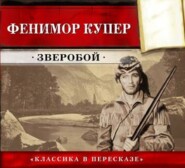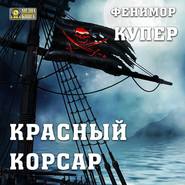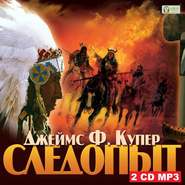По всем вопросам обращайтесь на: info@litportal.ru
(©) 2003-2024.
✖
The Spy: Condensed for use in schools
Настройки чтения
Размер шрифта
Высота строк
Поля
The hills on the eastern side of the valley were abrupt, and frequently obtruded themselves in rocky prominences into its bosom. One of these projections was but a short distance in the rear of the squadron of dragoons, and Dunwoodie directed Captain Lawton to withdraw with two troops behind its cover. Dunwoodie knew his man, and had selected the captain for this service both because he feared his precipitation in the field, and knew, when needed, his support would never fail to appear. On the left of the ground on which Dunwoodie intended to meet his foe was a close wood, which skirted that side of the valley for the distance of a mile. Into this, then, the guides retired, and took their station near its edge, in such a manner as would enable them to maintain a scattering but effectual fire on the advancing column of the enemy.
Dunwoodie’s men now sat panting to be led once more against foes whom they seldom charged in vain. A few minutes enabled the major to distinguish their character. In one troop he saw the green coats of the Cow-Boys and in the other the leathern helmets and wooden saddles of the yagers.[54 - These were Hessian soldiers (from Hesse-Cassel, in Germany) hired by Great Britain. The Cow-Boys were Americans enlisted as soldiers in the British army. On the next page they are referred to as the “refugee troop.”] Their numbers were about equal to the body under his immediate orders.
On reaching the open space near the cottage of Harvey Birch, the enemy halted and drew up his men in line, evidently making preparations for a charge. At this moment a column of foot appeared in the vale, and pressed forward to the bank of the brook we have already mentioned.
Major Dunwoodie at once saw his advantage, and determined to profit by it. The column he led began slowly to retire from the field, when the youthful German who commanded the enemy’s horse, fearful of missing an easy conquest, gave the word to charge. The Cow-Boys sprang eagerly forward in the pursuit; the Hessians followed more slowly, but in better order. The trumpets of the Virginians now sounded long and lively; they were answered by a strain from the party in ambush that went to the hearts of their enemies. The column of Dunwoodie wheeled in perfect order, opened, and, as the word of charge was given, the troops of Lawton emerged from their cover, with their leader in advance, waving his sabre over his head, and shouting in a voice that was heard above the clamor of the martial music.
The charge threatened too much for the refugee troop. They scattered in every direction, flying from the field as fast as their horses could carry them. It was upon the poor vassals of the German tyrant that the shock fell. Many of them were literally ridden down, and Dunwoodie soon saw the field without an opposing foe.
Captain Wharton had been left in the keeping of two dragoons, one of whom marched to and fro on the piazza with a measured tread, and the other had been directed to continue in the same apartment with the prisoner.
The lawn in front of the Locusts was hidden from the road by a line of shrubbery, and the horses of the two dragoons had been left under its shelter to await the movements of their masters.
At this moment two Cow-Boys, who had been cut off from a retreat to their own party, rode furiously through the gate, with an intention of escaping to the open wood in the rear of the cottage. Feeling themselves in the privacy of the lawn, relieved from any immediate danger, they yielded to a temptation that few of the corps were ever known to resist – opportunity and horseflesh – and made towards their intended prizes by an almost spontaneous movement. They were busily engaged in separating the fastenings of the horses, when the trooper on the piazza discharged his pistols, and rushed, sword in hand, to the rescue.
This drew the wary dragoon in the parlor to the window.
He threw his body out of the building, and with dreadful imprecations endeavored by threats and appearance to frighten the marauders from their prey. The moment was enticing. Three hundred of his comrades were within a mile of the cottage; unridden horses were running at large in every direction, and Henry Wharton seized the unconscious sentinel by his legs and threw him headlong into the lawn. Cæsar vanished from the room, and drew a bolt of the outer door.
Recovering his feet, the sentinel turned his fury for a moment on his prisoner. To scale the window in the face of such an enemy, was, however, impossible, and on trial he found the main entrance barred.
His comrade now called loudly upon him for aid, and forgetting everything else, the discomfited trooper rushed to his assistance. One horse was instantly liberated, but the other was already fastened to the saddle of a Cow-Boy, and the four retired behind the building, cutting furiously at each other with their sabres, and making the air resound with their imprecations. Cæsar threw the outer door open, and pointing to the remaining horse, that was quietly biting the faded herbage of the lawn, he exclaimed:
“Run, now, run – Massa Harry, run!”
“Yes,” cried the youth, as he vaulted into the saddle, “now indeed, my honest fellow, is the time to run.”
When the fortune of the day was decided, and the time arrived for the burial of the dead, two Cow-Boys and a Virginian were found in the rear of the Locusts, to be included in the number.
Wharton’s horse was of the best Virginian blood, and carried him with the swiftness of the wind along the valley; and the heart of the youth was already beating tumultuously with pleasure of his deliverance, when a well-known voice reached his startled ear, crying loudly:
“Bravely done, captain! Don’t spare the whip, and turn to your left before you cross the brook.”
Wharton turned his head in surprise, and saw, sitting on the point of a jutting rock that commanded a bird’s-eye view of the valley, his former guide, Harvey Birch. The English captain took the advice of this mysterious being, and finding a good road which led to the highway that intersected the valley, turned down its direction, and was soon opposite to his friends. The next minute he crossed the bridge, and stopped his charger before his old acquaintance, Colonel Wellmere.
“Captain Wharton!” exclaimed the astonished commander of the English troops.
“Thank God!” cried the youth, recovering his breath, “I am safe, and have escaped from the hands of my enemies.”
The captain briefly explained to the group of listeners the manner of his capture, the grounds of his personal apprehensions, and the method of his escape. By the time he had concluded his narration, the fugitive Germans were collected in the rear of the column of infantry, and Colonel Wellmere cried aloud:
“From my soul I congratulate you, my brave friend; prepare yourself to grant me your assistance, and I will soon afford you a noble revenge.”
“I do not think it altogether prudent to cross this brook into the open plain, in the face of those Virginian horse, flushed as they must be with the success they have just obtained,” returned young Wharton.
“Do you call the rout of those irregulars and these sluggish Hessians a deed to boast of?” said the other.
“And I must be allowed to say, Colonel Wellmere, that if the body-guards of my king were in yon field, they would meet a foe that it would be dangerous to despise. Sir, Mr. Dunwoodie is the pride of Washington’s army as a cavalry officer,” cried Henry, with warmth.
Colonel Wellmere inquired with a supercilious[55 - haughty.] smile:
“You would not have us retire, sir, before these boasted horsemen, without doing something that may deprive them of part of the glory which you appear to think they have gained?”
“I would have you advised, Colonel Wellmere, of the danger you are about to encounter.”
“Danger is but an unseemly word for a soldier,” continued the British commander, with a sneer.
“And one as little dreaded by the 60th as any corps who wear the royal livery,” cried Henry Wharton, fiercely; “give but the word to charge, and let our actions speak.”
“Now again I know my friend,” cried Wellmere, soothingly; “but if you have anything to say before we fight that can in any manner help us in our attack, we’ll listen. You know the force of the rebels; are there more of them in ambush?”
“Yes,” replied the youth, chafing still under the other’s sneers; “in the skirt of the wood on our right are a small party of foot; their horse are all before you.”
“Where they will not continue long,” cried Wellmere, turning to the few officers around him. “Gentlemen, we will cross the stream in column and display on the plain beyond, or else we shall not be able to entice these valiant Yankees within the reach of our muskets. Captain Wharton, I claim your assistance as an aide-de-camp.”
The youth shook his head in disapprobation of a movement which his good sense taught him was rash, but prepared with alacrity to perform his duty in the impending trial.
CHAPTER VII.
DUNWOODIE’S TRAP AND THE RECAPTURE OF CAPTAIN WHARTON
During this conversation, which was held at a small distance in advance of the British column, and in full view of the Americans, Dunwoodie had been collecting his scattered troops, securing his few prisoners, and retiring to the ground where he had been posted at the first appearance of his enemy.
Captain Lawton suddenly exclaimed: “How’s this! a blue coat among those scarlet gentry? As I hope to live to see old Virginia, it is my masquerading friend of the 60th, the handsome Captain Wharton, escaping from two of my best men!”
He had not done speaking when the survivor of these heroes joined his troop, bringing with him his own horse and those of the Cow-Boys; he reported the death of his comrade, and the escape of his prisoner.
This intelligence made an entire change in the views of Major Dunwoodie. He saw at once that his own reputation was involved in the escape of the prisoner, and he now joined with Lawton, watching for an opening to assail his foe to advantage.
“There,” cried the delighted captain, as he pointed out the movement of Wellmere crossing the brook into the open plain; “there comes John Bull into the mousetrap, and with his eyes wide open.”
“Surely,” said Dunwoodie, eagerly, “he will not display his column on that flat. Wharton must tell him of the ambush. But if he does – ”
“We will not leave him a dozen sound skins in his battalion,” interrupted the other, springing into his saddle.
The truth was soon apparent; for the English column, after advancing for a short distance on the level land, displayed with an accuracy that would have done them honor on a field-day in their own Hyde Park.[56 - a noted park in London.]
“Prepare to mount – mount!” cried Dunwoodie.
As the British line advanced slowly and in exact order, the guides opened a galling fire. It began to annoy that part of the royal troops which was nearest to them. Wellmere listened to the advice of the veteran who was next to him in rank, and ordered two companies to dislodge the American foot from their hiding-place. The movement created a slight confusion, and Dunwoodie seized the opportunity to charge. No ground could be more favorable for the manœuvres[57 - changes in position.] of horse, and the attack of the Virginian was irresistible. It was aimed chiefly at the bank opposite the wood, in order to clear the Americans from the fire of their friends who were concealed; and it was completely successful. Wellmere, who was on the left of the line, was overthrown by the impetuous[58 - violent; fierce.] fury of his assailants. Dunwoodie was in time to save him from the impending blow of one of his men, and raised him from the ground, had him placed on a horse, and delivered to the custody of his orderly.
The left of the British line was outflanked by the Americans, who doubled in their rear, and thus made the rout in that quarter total. Henry Wharton, who had volunteered to assist in dispersing the guides, was struck on his bridle-arm by a ball, which compelled him to change hands. His charger became ungovernable, and his rider, being unable with his wounded arm to manage the impatient animal, Henry Wharton found himself, in less than a minute, unwillingly riding by the side of Captain Lawton. The dragoon comprehended at a glance the ludicrous situation of his new comrade, but he had only time to cry aloud before they plunged into the English line:
“The horse knows the righteous cause better than his rider. Captain Wharton, you are welcome to the ranks of freedom.”
No time was lost, however, by Lawton, after the charge was completed, in securing his prisoner again; and perceiving him to be hurt, he directed him to be conveyed to the rear.
Captain Lawton called to a youth, who commanded the other troop, and proposed charging the unbroken line of the British. The proposition was as promptly accepted as it had been made, and the troops were arrayed for the purpose. The eagerness of their leader prevented the preparations necessary to insure success, and the horse, receiving a destructive fire as they advanced, were thrown into additional confusion. Both Lawton and his more juvenile comrade fell at this discharge. Fortunately for the credit of the Virginians, Major Dunwoodie reëntered the field at this critical instant. The eye of the youthful warrior flashed fire. At his feet lay Captain Singleton and Captain Lawton. Riding between his squadron and the enemy, in a voice that reached the hearts of his dragoons, he recalled them to their duty. His presence and words acted like magic. The line was formed promptly and with exactitude; the charge sounded; and, led on by their commander, the Virginians swept across the plain with an impetuosity that nothing could withstand, and the field was instantly cleared of the enemy; those who were not destroyed sought a shelter in the woods. Dunwoodie slowly withdrew from the fire of the English, who were covered by the trees, and commenced the painful duty of collecting the dead and wounded.

















